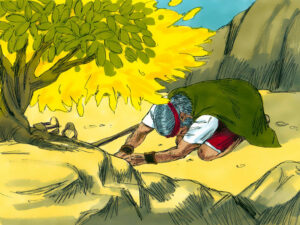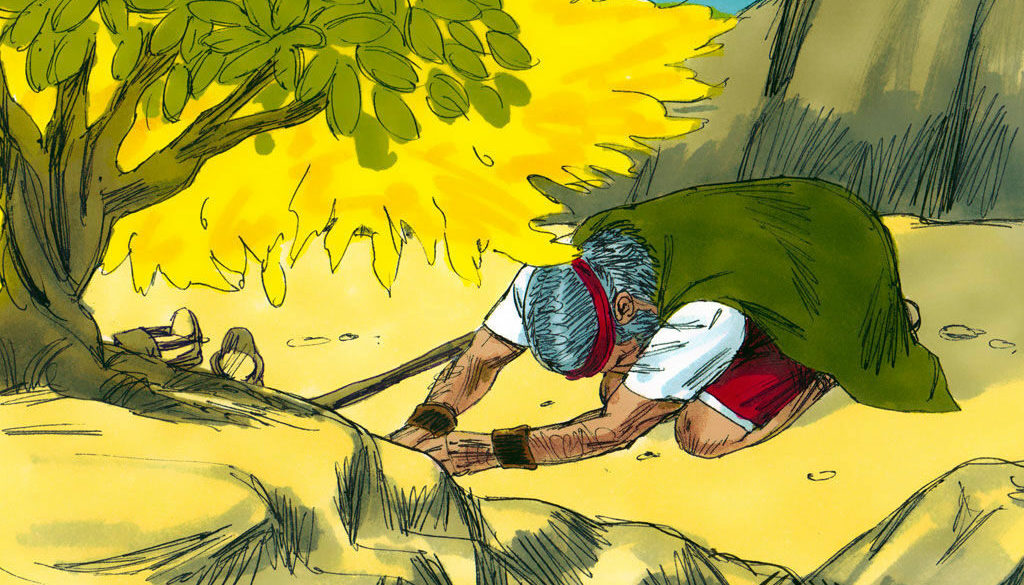Exodus 3 God heard

Moses is called by God because God heard Israel’s cry. It’s time to do something about it. Moses will take some convincing before he agrees to help.
We get to watch Moses as he meets the God of Israel. God doesn’t call Himself the God of Moses because Moses doesn’t really know Him yet. He will get a crash course in God’s promises and determination. Moses tried everything he could think of to get God to choose another representative, but God held fast. God would eventually agree to sending Moses’ brother, Aaron, with him. Moses was saved and raised in Egypt for a reason. And this was it.
♥ ♦ ♥
Moses ran from Egypt when he was 40 years old. It took him that long to get curious about his own people. He is afraid to go back, and he really doesn’t want to. He has a good life here in Midian. It’s nothing like the life he lived in Pharaoh’s palace. When he was still in Egypt, he had no needs. Everything he wanted was right there for the taking. In Midian, he has to work for the things he needs and wants. It is a MUCH more satisfying way to live.
While Moses is in Midian, his people are still under the thumb of Egypt. The Pharaoh, whom Moses had grown up under, is now dead. The new Pharaoh is no better, as far as the people of Israel are concerned. They groan and cry out for help, for rescue from slavery, because of the treatment they are receiving.
Their cries reach God’s ears, and He remembers the promises that He made to Abraham, to Isaac, and to Jacob. The promises that concern these very people. “It’s time to bring My people out”, says God.
He knows everything that is going to be required to free His people. He is ready to begin with ‘Step 1’. ‘Step 1’ begins with Moses getting on board with God’s plan.
“We need to get his attention”, the Father tells the Son.
“How are you going to go about it this time?” questions the Son.
“Watch and listen. It’s going to blow his socks off!”
“I want you to go down into that bush, right over there” God says as He points out the bush in question to His special angel. “It needs to look like it is on fire. But don’t let any of it be burned up in the fire. This will get Moses’ attention. Once we have his attention, I will speak directly through you to him.”
The angel of the Lord quickly descends onto the bush that God has indicated. He begins to blaze like flames. He makes the sounds of crackling wood and raises his flames above the bush. They are high enough that Moses can’t help but notice them.
Movement among the bushes catches Moses’ eye. He moves in the direction of what caught his attention. As he gets closer, he sees that it is a bush, and it is burning.
The first thought in Moses’ head when he sees the bush on fire is that it can wipe out an entire town. He is concerned for the safety of his new family. But then something else gets his attention. The bush, where the fire is located, is not burning up in the least. Not even the leaves are singed!
“How is this possible” Moses wonders to himself. While he is pondering this sight, he hears someone or something call his name.”
“Moses, Moses.”
Moses answers instinctively. “Here I am.”
“Do not come near; take your sandals off your feet, for the place on which you are standing is holy ground” (Exodus 3:5).
Moses is both shocked and a little confused. But he immediately takes off his shoes. He has no idea what he is supposed to do next, so he simply waits. He really doesn’t have time to wait. He needs to get back to his sheep, but something compels him to stand fast.
A voice swells up out of the bush again. “I am the God of your father, the God of Abraham, the God of Isaac, and the God of Jacob” (Exodus 3:6).
This terrified Moses even more than the bush had. Moses hides his face so that he won’t be looking at the face of God.
God is impressed with Moses’ humility. He knows that Moses knows very little about Him. He didn’t grow up listening to the promises of Israel’s future. “It’s time he learned all about me” God thinks to Himself.
“I have surely seen the afflictions of my people who are in Egypt and have heard their cry because of their taskmasters. I know their suffering, and I have come down to deliver them out of the hand of the Egyptians and to bring them up out of that land to a good and broad land, a land flowing with milk and honey, to a place of the Canaanites, Hittites, the Amorites, the Perizzites, the Hivites, and the Jebusites. And now, behold, the cry of the people of Israel has come to me, and I have seen the oppression with which the Egyptians oppress them. Come, I will send you to Pharaoh that you may bring My people, the children of Israel, out of Egypt” (Exodus 3:7-10).
Moses’ jaw drops. “Surely not ME” he thinks. When he found enough strength to speak, Moses says; “Who am I that I should go to Pharaoh and bring the children of Israel out of Egypt?” (Exodus 3:11)
God isn’t giving up. “But I will be with you, and this shall be the sign for you, that I have sent you: when you have brought the people out of Egypt, you shall serve God on this mountain” (Exodus 3:12).
“I would be much happier with a sign NOW” thinks Moses. Moses sighs deeply before continuing. “This is not going to be easy. ‘If I come to the people of Israel and say to them, “The God of your fathers has sent me to you,” and they ask me, “What is his name?” what shall I say to them?’ (Exodus 3:13b).”
“I AM WHO I AM”, God boomed from the burning bush. Moses’ knees began to buckle. He reaches out his hand to a nearby rock to steady himself. God gentles His voice and continues.
“Say this to the people of Israel: ‘I AM has sent me to you’” (Exodus 3:14).
“And how is that supposed to convince them” wonders Moses. “I don’t even know what that means!”
God continues on with instructions for Moses on how to convince the people the HE had sent him. “Say this to the people of Israel: ‘The Lord, the God of your fathers, the God of Abraham, the God of Isaac, and the God of Jacob, has sent me to you.’ This is my name forever, and thus I am to be remembered throughout all generations…”
“I can get behind that name. They should recognize their own ancestors” reasons Moses.
“…Go and gather the elders of Israel together and say to them, ‘The Lord, the God of your fathers, the God of Abraham, of Isaac, and of Jacob, has appeared to me, saying “I have observed you and what has been done to you in Egypt, and I promise that I will bring you up out of the affliction of Egypt to the land of the Canaanites, the Hittites, the Amorites, the Perizzites, the Hivites, and the Jebusites, a land flowing with milk and honey.”’ And they will listen to your voice, and you and the elders of Israel shall go…”
“Finally! I don’t have to do this alone” thinks Moses.
“…to the king of Egypt and say to him, ‘The Lord, the God of the Hebrews, has met with us; and now, please let us go a three days’ journey into the wilderness, that we may sacrifice to the Lord our God.’ But I know that the king of Egypt will not let you go unless compelled by a mighty hand…”
Moses shakes his head. “Then why go in the first place” he wonders.
“…So I will stretch out my hand and strike Egypt with all the wonders that I will do in it; after that he will let you go…”
“So why not wait until after that to go to him” wonders Moses.
“…And I will give this people favor in the sight of the Egyptians; and when you go, you shall not go empty, but each woman shall ask of her neighbor, and any woman who lives in her house, for silver and gold jewelry, and for clothing. You shall put them on your sons and on your daughters. So you shall plunder the Egyptians” (Exodus 3:15-22).
“Now THIS is a program I can get behind. WAY behind. You should probably choose someone else to be your front man” Moses thinks to himself.
(to be continued)
Here are a couple lessons we can take from Moses’ early interactions with God. 1) He answered immediately when called. 2) He asked for references to make SURE Who he was talking to. 3) He listened to instructions before chiming in. Oh he will chime in during our next time together, but for today’s reading he listens first.
God won’t do anything with us if we don’t first answer when He calls. He doesn’t leave messages on answering machines saying we will get back with Him when we have a minute. He demands our attention before He begins His instructions. Be still and listen!
Don’t just listen to any voice that grabs your attention. Check out the source. This goes for your daily life as well as your spiritual one. Don’t listen to the voices of those who aren’t backed by God. Your ‘good buddy’ who thinks it might be fun to kick up a little trouble in town should receive a closed ear as quickly as Satan would. If it isn’t from God, or He would tell you ‘Don’t listen!’, RUN the other way, supposed miracle or not! Satan knows how to imitate. BE SURE OF YOUR SOURCE!!!
Let God have His say. Listen with an open heart to what He has to say. He WILL let you have your say too, but it is impossible to communicate when both individuals involved are talking at the same time. WAIT until you have heard what He has to say before even beginning to come up with your answer.
Father God, I’m guilty of not following all three of these ‘rules’ myself. I KNOW I get busy and want You to wait ‘until I have time’ to listen. I also have been known to jump in before You have finished, or plan my answer while only half listening. That gets me into a WHOLE LOT of messes! As for the source issue, I’m always afraid I’m being bamboozled by my own ‘thoughts’ instead of really listening to You. I wish I could be as certain as Moses was when You spoke to him. I know ‘Your sheep know Your voice’ but I’m afraid of missing it.
Help me Holy Spirit in ALL these areas. I want to be SO familiar with Your voice that NO OTHER even comes close to approximating it. I know this comes from time spent with You. Thank You for meeting me here and speaking to me so I can hear You better and better every day. Keep Talking! And I pray I Keep Listening and walking in what You say. AND that I wait until You are done before I get up and go. I wonder how different my life would be if I had learned some of these lessons a LONG TIME AGO!



